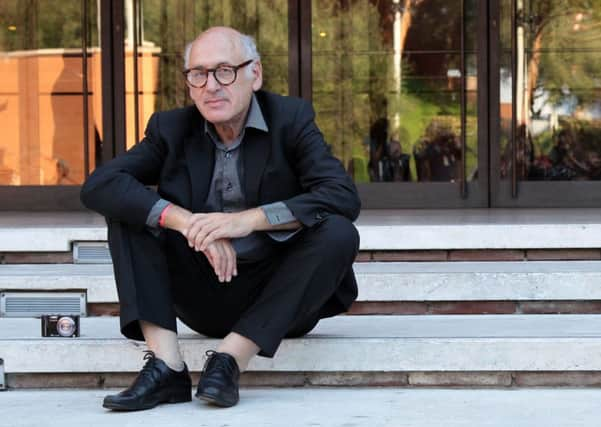Michael Nyman brings reworked Baroque to Edinburgh


Who knows, the answer may just have been given in the spirit of cool; as in, “hey, we’ll see how the mood hits us and take it from there”. Yet the more I spoke to the man best known for his film scores to Jane Campion’s The Piano, or Peter Greenaway’s The Draftsman’s Contract and Prospero’s Books, the clearer it became that Nyman knows exactly what he’s about, ploughs his own inoffensive minimalist furrow with little concern for critical jibes, and is perfectly clear in his mind as to what Wednesday’s programme is all about.
“I did a concert at the [Royal] Festival Hall about a year ago which I called, very pretentiously, Nyman and the Baroque, and it kind of worked really well,” he explains. “It has a unity in the sense that every piece we played originated in something by Monteverdi, Purcell, Handel or Biber. That’s Heinrich Biber, by the way, not Justin,” he adds, just in case I hadn’t twigged.
Advertisement
Hide AdIt shouldn’t come as much of a surprise that Edinburgh’s concert will follow similar lines. For if you look at 70-year-old Nyman’s output since he turned full-time composer in 1976, after a successful career as a musicologist and critic, whether it be music for the theatre, film or concert hall, the basis of his instantly recognisable minimalist style has always been music from the past.
Come unto these yellow sands from Prospero’s Books, for instance, is based on a Passacaglia by Couperin, and The Musicologist’s Tour, written as a BBC Proms commission five years ago, he describes as “oscillating between Purcell, Handel and Nyman”.
“In fact, the whole programme is a kind of musicological tour. Everything derives from around 1650 and beyond, music that I’ve shoved into a lot of different contexts like the concert hall or cinema,” he explains. “It all sums up what I’ve done as a composer: which is to look through a spyglass at other composers’ music. What I do to Baroque music is so recognisably me, so unrecognisably Baroque, that you wouldn’t necessarily recognise the source material.”
Musicology has always been important to Nyman. As a research student at King’s College London, he worked under the celebrated father of modern-day historically informed Baroque performance practice Thurston Dart, producing two influential musicological performing editions – one of Handel’s Concerti Grossi, Op 6 for Eulenberg; the other of Purcell’s notoriously bawdy Tavern Catches – which use the process of canon mischievously to transform apparent nonsensical syllables into filthy language.
“I was the first person since 1820 to put back the dirty words,” says Nyman. He also claims, in his 1960s and 1970s role as music critic for The Spectator, to have been the first writer ever to use the word “minimalism” to describe the reactive 1960s American musical style of Reich, Glass and Reilly, etc, that he was later to adopt for his own purposes. “It simply means ‘a small amount of musical material’,” he says.
Nyman’s serious interest in composition goes back to his initial training at the Royal Academy of Music in London, where he studied with the ultra-modernist-turned-socialist-realist Alan Bush, a progressive who formulated a 12-tone technique equivalent to Schoenberg’s, spurred on by his interest in folk music, in a way that preserved basic tonal properties.
Advertisement
Hide AdAn analytical interest in early music; an inherent radicalism tempered by the raw expressive potential of basic tonality; a fascination in music applied to the spoken word or moving image stemming from his early collaborations with Harrison Birtwistle when the latter was musical director of the National Theatre – suddenly Nyman’s often-maligned brand of minimalism (generously described as bitingly accessible, though occasionally not-so-generously described as repetitively benign) begins to tally up.
Much of its character boils down to the signature raw energy of the Michael Nyman Band, an ensemble that took flight in the late 1970s, and growing out of Nyman’s sudden need to form a stage band for a National Theatre production capable of emulating in modern terms the “street sound” of raucous Renaissance shawms.
Advertisement
Hide Ad“I wanted the loudest possible unamplified sound, so went for mainly saxophones,” he recalls. “It worked so well I thought, why not take them off stage, keep the musicians and instruments, and perform concerts. Birtwistle wanted concerts in the theatre foyer, so I sat down and wrote 40 minutes of music. In effect, I became a composer by accident.” The famous collaborations with film director Peter Greenaway soon followed.
Nyman, who as a writer penned the libretto for Birtwistle’s dramatic pastoral Down by the Greenwood Side, writes only musical notes these days, not words. “I am a word-free zone,” he declares, even when it comes to his own films, which “are all about observing street stuff – films with music, but without text, written by me”.
His own film creations were the focus of a fascinating installation by Paul Robertson at Edinburgh’s Summerhall venue during the 2013 Edinburgh International Festival, which then transferred to Miami, Mexico and elsewhere. “Paul is one of the world’s great visionaries,” Nyman believes. “What he did for me was fantastic”.
Nyman turned 70 last month, but still gets a kick out of hitting the road with his band. For much longer, though? “That’s a very good question.”
• The Michael Nyman Band performs at the Queen’s Hall, Edinburgh on 23 April, www.thequeenshall.net